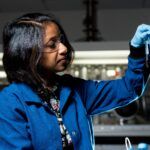Expected Outcome
This topic refers to the innovation market for Sustainable Textiles and will support citizens and their needs. Europe’s textile sector, its technology providers and research community are world leading. The most technologically advanced textile products are being manufactured in Europe and new manufacturing value chains such as technical textiles, in the 1990’s and early 2000’s are developed in Europe first.
Several materials specifications and related innovations needs will support this topic such as renewable and recyclable materials, alternative active ingredients, design for circularity.
Projects are expected to contribute to the following outcomes:
- The innovation market of sustainable textiles requires the use of a new generation of renewable and recyclable materials designed with properties that are inspired by nature.
- Bioinspired and biomimetic advanced materials that do not require or limit the need to use chemical additives or coatings will have a positive impact on the environment, the climate, and the circularity of textile materials, in view of the Safe and Sustainable by Design Framework.
- Smart functions or functionalities of textiles will address future consumer needs.
- Low-cost, low-resource, and low environment-impact high performance durable fibres and textiles from renewable sources will serve for technical end markets.
- Develop effective circularity enabling technologies for technical textiles, non-woven and fibre-reinforced composites, e.g. biopolymer or natural fibre based high performance fibres.
- Use of hazardous chemical processing shall be reduced and reserved for crucial technical functionalities of textiles.
- Designed circularity for renewables and recyclable materials supporting the sustainable use of textiles, reducing the CO2-footprint of the textiles industry.
Scope
Proposals should address at least three of the following activities:
- Bio-inspired and biomimetic polymers for use as smart textile materials will provide improved functionalities, e.g. for outdoor use.
- The molecular functionalities of natural polymers, and their macromolecular structures and properties, provide inspiration for designing different classes of high-performance polymeric materials that aim to reproduce specific functions of natural polymers, such as adaptability, self-healing, adhesiveness, surface super-hydrophobicity, chiral recognition, and bioactivity.
- Biodegradability and recyclability of polymers will be a factor, so the consideration of natural polymers, such as polysaccharides, proteins, lignin-based polymers and composites could be a pathway. This is expected to translate into lower GHG-emissions in the textiles value chain, as well as reducing landfill waste volumes.
- Projects must prove scalability of biomimetic materials for the manufacturing process of smart fabrics and sustainable textiles.
- To enable a fast development of new advanced materials, digital tools such as modelling, simulation and characterisation techniques (including those provided by analytical infrastructures) are under the scope, assisted by advanced methods, e.g. physics-based methods, machine learning or artificial intelligence.
Dovetailing with digital technology, e.g. sensors, is encouraged.
Materials and products should be developed under Safe and Sustainable by Design framework taking into account circularity aspects, and with prognostic and product health management to ensure product and system reliability.
Proposals submitted under this topic should include a business case and exploitation strategy, as outlined in the introduction to this Destination.
Projects should build on or seek collaboration with existing projects and develop synergies with other relevant European, national or regional initiatives, funding programmes and platforms.
Deadline
7 March 2023
For further infomation: Funding & tenders






Leave a Reply